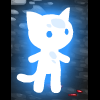
The moral of the episode, wrapped up near the end in the show's signature letter to Celestia, is that acts of bravery and heroism are great, but they should be handled with "grace and humility".
The Mane Six (sans Rainbow Dash) realized quickly that her status as Ponyville's number one heroine was quickly going to her head. Determined to set her on the path of righteousness and humility, the Mane Six concoct a plan: to pool their talents to create a hero unlike anything Ponyville has ever seen. Now outmatched by a veritable superhero, the wind is completely ripped from Rainbow Dash's sails.
One huge problem with the episode is almost immediately apparent: the Mane Six's plot to put Rainbow in her place is incredibly mean-spirited. The only thing that they seem to have in mind to accomplish with their mysterious persona is to put Rainbow Dash in her place. From what they explain to Rainbow during the heartfelt conclusion, they were only trying to make her ease up on the bragging.
But for a show that so emphasizes civil relations between friends, does it ever occur to the Mane Six to just talk to Rainbow about the problem? Throughout the episode, they aren't shown talking to Rainbow about their concerns even once. In this episode, the ponies are just zero-to-sixty with little to no provocation. Rainbow Dash acting pompous? Better create an elaborate superhero persona to make sure she doesn't get too confident! Their first instinct, apparently, is not to make Rainbow aware of their concerns so she can correct herself. The ponies going behind Rainbow's back to undermine her self-confidence through deceit and malice is not what fans expect nor desire to see from our normally cheerful protagonists.
Does this plan even make sense, though, given Rainbow's overall nature in the show? No, not really. One of the core facets of Rainbow Dash's character is her great amount of confidence. Rainbow acting arrogant was not novel for the show, even at the time when Mare-Do-Well was first aired.
This raises the question of whether or not the plot of the Mane Six is even effective in the first place. Does Mare-Do-Well begin to shake Rainbow's confidence? Yes. But does this lead Rainbow to ease up on the bragging, and to start acting with more humility? Far from it. Rainbow Dash does begin to act in cringe-inducingly pompous ways later in the episode, but this occurs as a result of Mare-Do-Well. Rainbow doesn't scour Ponyville for villainous jars of peanut butter to open (and demanding praise after the fact) until after the Mane Six begin to interfere. In effect, then, the plot of the Mane Six actually causes Rainbow to act even more arrogantly than before.
For all of this trouble, is Rainbow even in the wrong for acting arrogantly in the first place? On closer inspection, her actions seem almost entirely justified given the rather unforgiving nature of Ponyville's equine denizens. Even in light of Rainbow rescuing a baby and several elderly ponies from death or grave injury, Ponyville is quick to declare her yesterday's news as soon as Mare-Do-Well shows up on the scene. They even go as far as to claim that they had "never seen such bravery" in their entire lives. They seem to forget Rainbow Dash completely, so is it any wonder that she tries to salvage her reputation? Bragging may not be the best way to go about this, but it makes sense that she would attempt to remind Ponyville that she saved lives before Mare-Do-Well even arrived on the scene.
And such heroism in Ponyville is compounded given how terrifyingly frequent disasters appear to be. Even if the perils shown left and right in the episode aren't indicative in themselves, Rainbow approaches a cliff and says that "buses and baby carriages are always careening down this hill!". Even if she were exaggerating, it would seem that such events occur often, as she would have no reason to say that at all if those incidents were not at least somewhat commonplace.
In light of this, it becomes even more understandable that Rainbow Dash would desire some recognition, and even more befuddling that the Mane Six would find her actions so inexcusable. This befuddlement comes to its zenith near the end of the episode, when Ponyville holds a large parade of Mare-Do-Well, which the masked heroine herself attends. Apparently being caught up in your accomplishments is okay as long as you're not Rainbow Dash. The double standard the Mane Six create is a slap in the face both to Rainbow and to the viewer.
The Mysterious Mare-Do-Well does not sit in good standing with a significant portion of bronies, and it's not difficult to see why. The conflict of Rainbow becoming too pompous doesn't hold up, and the solution that the Mane Six concoct is not only arbitrary, but frighteningly out of character. It almost seems like the episode revolves around mere caricatures of the ponies we've grown to love. The Mane Six are cruel, Ponyville is unforgiving, and Rainbow Dash is singled out and pays a hefty price for daring to acknowledge her feats while simultaneously being Rainbow Dash. There are good laughs to be had in the episode, certainly, and taken on its own it's not impossible to enjoy. But when the ponies' actions and attitudes fly in the face of what we've come to expect, the experience feels more than a little disconcerting coming from a show whose fandom was almost singlehandedly created due to the characters.
Merriwether Williams, your attempt is respectable and your writing is by no means terrible. Just don't expect us to invite you to any parades.
- Read more...
- 3 comments
- 3,939 views


